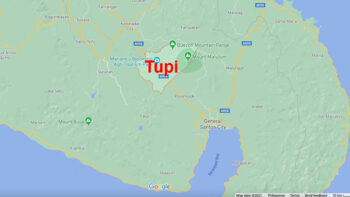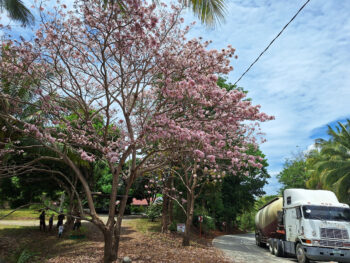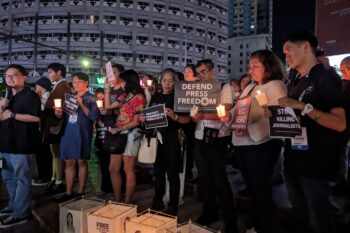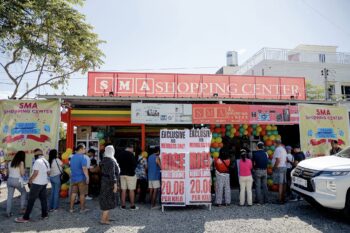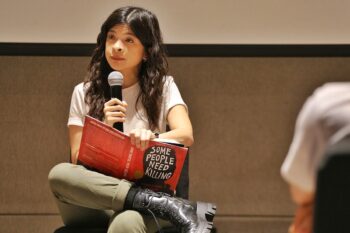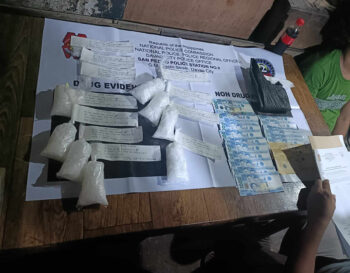QUEZON CITY (MindaNews/05 Nov) — I sit as Independent Observer to the Government-Monitoring Committee (GPH-MC) on CARHRIHL (Comprehensive Agreement on Respect for Human Rights and International Humanitarian Law), the first substantive agreement signed between the Government of the Philippines (GPH) and the National Democratic Front of the Philippines (NDFP). My job is to ensure that there is transparency in monitoring the compliance to human rights (HR) and international humanitarian law (IHL) of both parties; and to ensure that the accountability-lines with the broad civil society is established.
So, while I sit in the GPH-MC, I am not part of the government team and am not obliged to carry the official position of the state. In short, I am in the process but I am also an outsider. [It’s like being in the front-row seat and “in-rubbing-elbows” with the actors, but is just observing how the ‘movie’ unfolds.]
I therefore watch with concern the developments in the talks, especially when the exchanges between the NDFP and the Government panel began to heat up. The issue of contention is JASIG (Joint Agreement on Safety and Immunity Guarantees).
The NDFP claims that the Government is reneging on its commitment to free the NDFP peace panel consultants based on the JASIG agreement. They further claim that apart from the four who have already been released, there are 13 more–currently detained and facing court cases–who must be freed immediately. They want the release (of most if not all) of the 13 as precondition for the talks to proceed. This demand puts the peace negotiations in a tenuous situation.
The JASIG was signed on Feb 24, 1995. Under the agreement, negotiators, consultants, staff, security, and other personnel of the negotiating panel of each side (“not exceeding 85 in number”) are granted immunity (from surveillance, harassment, search, arrest, detention, prosecution and interrogation and other similar punitive actions) and have safe conduct passes so they can move freely and unhindered in “all areas in the Philippines in connection with the performance of their duties in the peace negotiations.”
All peace panel negotiators, consultants et al are supposed to hold two documents: (a) a document of identification (DI) issued by the respective party, and (b) an acknowledgment letter (AL) issued by the other party.
As additional verification measure, each of the personnel enumerated are supposed to “submit a photograph to the Chairperson of the Negotiating Panel to which he/she belongs. Said photograph shall be placed in a sealed envelope and shall be entrusted to the custody of a mutually acceptable third party… the sealed envelope shall be deposited in a safety deposit box protected by three separate locks and shall be opened only when the need for further verification of identity arises…” The assumed name and the true name are supposed to accompany the photographs.
I am not a lawyer but I do know that the rule in statutory construction is to take the sentence or phrase at its face value. If the agreement says “submit a photograph” and “(s)aid photograph shall be placed in a sealed envelope…” the clear reference is to a hard copy or a printed photo.
When the peace talks between the GPH and the NDFP resumed in February of this year, both parties agreed on a timetable: 18 months to three years. This means that the panel will concentrate on the three substantive agenda items–socio-economic reforms (SER), political-constitutional reform (PCR), and end of hostilities-disposition of forces (EoF-DoF). The first substantive agreement, the CARHRIHL, was already signed in 1998. In other words, the SER, PCR, and EoF-DoF are the most important agenda items in the talks.
They also agreed that the Government will work on the release of NDF consultants subject to the verification process. Sixteen years after the JASIG was signed, I think it’s only fair to move for verification of identities especially if the consultants don’t have with them any of the two documents mentioned above (DI and AL).
When the safety deposit box was opened, the sealed envelope, supposedly containing the photographs, names, and aliases of the NDF consultants, yielded diskettes–not printed photographs, but diskettes. Adding malady to this revelation was that the content of the diskettes were encrypted, and the NDFP team could not de-crypt their files.
So the verification process failed.
The NDF accuses the government of not complying with the JASIG agreement. But how can the government comply if in the first place there is no way to verify whether the NDF’s claim is true (that the 13 are NDF peace process consultants)?
Because of the JASIG issue, the three substantive agenda items, supposedly the “stars” of the talks, are being sidelined. The SER and PCR, slated for discussion in June and August, respectively, have been postponed. The problem is this: the panels agreed on a time table and the supposed October-November scheduled meeting is contingent on outputs from the June (SER) and August (PCR) technical working group meetings. How then can the panel make up for lost time?
So are we back to where we started? I hope not–the peace talks have been on-going for 24, now 25, years. They have to continue, and there has to be an end in sight. It is, therefore, crucial now, more than ever, for groups supportive of the negotiations to make their voices heard and pressure the parties to return to the table and talk. Keep talking.
The author is Asst. Professor of Political Science of Ateneo de Manila University, and is actively engage in research on security sector reform.

